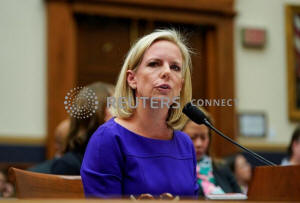|
U.S. to send migrants back to Mexico to
wait out asylum requests
 Send a link to a friend
Send a link to a friend
 [December 21, 2018]
By Yeganeh Torbati and Anthony Esposito [December 21, 2018]
By Yeganeh Torbati and Anthony Esposito
WASHINGTON/
MEXICO CITY (Reuters) - The
United States will soon send non-Mexican migrants who cross the U.S.
southern border back to wait in Mexico while their U.S. asylum requests
are processed, a major change in immigration policy, the Trump
administration announced on Thursday.
Immigrant advocates and human rights experts quickly denounced the
policy change as illegal and violating the rights of refugees.
Mexico's government said that it would accept some of those migrants for
humanitarian reasons, in what many will see as an early concession to
U.S. President Donald Trump's administration by Mexico's new president,
Andres Manuel Lopez Obrador, who took office on Dec. 1.
"We want to discourage those who are claiming asylum fraudulently," U.S.
Homeland Security Secretary Kirstjen Nielsen told a congressional
committee on Thursday, describing the plan.
In response to the plan, Mexico's foreign ministry underscored that it
still has the right to admit or reject the entry of foreigners into its
territory.
"Mexico's government has decided to take the following actions to
benefit migrants, in particular unaccompanied and accompanied minors,
and to protect the rights of those who want to start an asylum process
in the United States," the foreign ministry said.

But there appeared to be initial confusion within the Mexican government
about the plan. Tonatiuh Guillén, who as head of Mexico's National
Migration Institute regulates migration in the country, said at a news
conference on Thursday that the country would not be able to receive
migrants from other countries until the regulatory framework had been
established.
“We can't begin to operate, we can't begin to receive. We are not in a
place to receive," he said. "When will we able to do it? When the
regulatory issues and operational issues are resolved," he said.
Department of Homeland Security officials told reporters on condition of
anonymity that the Mexican government has said asylum seekers would have
access to attorneys in Mexico and that migrants would be able to enter
the United States for their court hearings, without giving more details
about how the process would work.
"Operationally this will look a little bit different at different ports
of entry simply based on what the infrastructure is like in the area,"
said one official. "We are not implementing this on the entire U.S.
border all at once."
Nielsen said the new policy will not apply to Central American
unaccompanied children, who have some special protections under U.S.
law.
The administration is invoking a section of the Immigration and
Nationality Act allowing the government to return migrants to a foreign
country bordering the United States pending their immigration
proceedings.
"We remain convinced that this is a power that the president was granted
by Congress to execute exactly the way we have," U.S. Secretary of State
Mike Pompeo said in an interview with Fox News show host Laura Ingraham.
"We've had lots of thought and legal review of this. We are confident
that we are on firm ground."
[to top of second column]
|

U.S. Secretary of Homeland Security Kirstjen Nielsen waits to
testify to the House Judiciary Committee hearing on oversight of the
Department of Homeland Security on Capitol Hill in Washington, U.S.,
December 20, 2018. REUTERS/Joshua Roberts

But the section of law being used by the Trump administration
exempts anyone who is found inadmissible at the border because of a
lack of documents, rather than for a criminal conviction, said
Stephen Legomsky, a professor at the Washington University School of
Law in St. Louis and a former senior DHS official during the Obama
administration.
"That means the exemption to that section would apply to virtually
every asylum seeker at the border," he said.
'NOT A SAFE COUNTRY'
Serious doubts remain over whether Mexico can keep vulnerable asylum
seekers safe. Authorities are investigating the deaths of two
Honduran teenagers kidnapped and killed in the border city of
Tijuana last weekend.
Immigrant and human rights advocates swiftly denounced the new
policy, saying it violated international law and would put migrants
at further risk.
"Make no mistake — Mexico is not a safe country for all people
seeking protection," said Amnesty International Executive Director
Margaret Huang. "Many people seeking asylum in the United States
face discrimination, exploitation, sexual assault, murder, or the
possibility of being disappeared while traveling through Mexico or
while forced to wait for extraordinarily long times in Mexican
border towns."
Trump tweeted on Nov. 24 that migrants at the U.S.-Mexico border
would stay in Mexico until their asylum claims were individually
approved in U.S. courts.
But Kennji Kizuka of the nonprofit group Human Rights First said
serious questions remain about implementation of the plan.
"The administration seems to have no plan," Kizuka said in a
statement. "Will lawyers be able to visit their clients before
hearings? Where will those hearings take place? We know that access
to counsel is one of the most important factors in whether or not an
asylum seeker is able to live in safety in the United States."
The arrival of several thousand Central Americans in Tijuana about a
month ago prompted Trump to mobilize the U.S. military to beef up
border security. At the same time, the Trump administration has
restricted the number of asylum applications accepted per day,
saying they do not have the capacity to process more.

Illegal crossings at the southern border have dropped dramatically
since the late 1970s, but in recent years applications for asylum
have ballooned and more Central American families and unaccompanied
children are migrating to the United States.
(Reporting by Anthony Esposito and Yeganeh Torbati, additional
reporting by Julia Love, Mica Rosenberg and Kristina Cooke; Editing
by Christine Murray and Jonathan Oatis)
[© 2018 Thomson Reuters. All rights
reserved.]
Copyright 2018 Reuters. All rights reserved. This material may not be published,
broadcast, rewritten or redistributed.
Thompson Reuters is solely responsible for this content. |